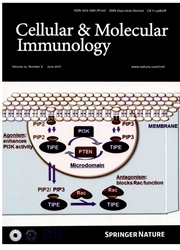

 中文摘要:
中文摘要:
CD59,属于膜补充规章的蛋白质(mCRPs ) ,禁止补充的 cytolytic 活动并且在稳固的癌症是过去表示的,包括卵巢癌症。现在的学习的目的是构造编码 shRNA 的 recombinant retrovirus 指向的人的 CD59 并且感染 A2780 房间以便调查在减少的 CD59 表示和卵巢癌症的 tumorigenesis 之间的关系。siCD59 和 siCD59-C 被分别地定序的 PCR,限制 endonuclease 分析和 DNA 成功地构造并且识别。siCD59 能高效地感染 A2780 房间,它被西方的弄污证实。当与新鲜正常人的浆液孵化了时(8% , v/v ) 为在 37 掳 C 的 1 h,房间生存能力被减少,房间损坏在感染的 siCD59 被增加与 siCD59-C 相比的 A2780 房间感染了房间。这导致了 caspase-3 的激活。在感染的房间用染色的 Hoechst 与 hypercondensed 原子核被显示出的 siCD59 的 apoptosis。同时,在裸体老鼠的卵巢肿瘤接枝的重量显著地与 siCD59-C 组的相比在 siCD59 组被减少。并且在在 siCD59 组的肿瘤织物的 CD59 蛋白质的表示显著地被减少。这些结果建议在经由调停 retrovirus 的 RNAi 的卵巢癌症房间的 CD59 silencing 能提高调停补充的房间损坏,禁止卵巢癌症的生长。CD59 可能是为在卵巢癌症的基因治疗的一个潜在的目标。
 英文摘要:
英文摘要:
CD59, belonging to membrane complement regulatory proteins (mCRPs), inhibits the cytolytic activity of complement and is over-expressed in solid cancers, including ovary cancer. The aim of the present study was to construct recombinant retrovirus encoding shRNA targeted human CD59 and infect A2780 cells in order to investigate the relationship between decreased CD59 expression and tumorigenesis of ovary cancer, siCD59 and siCD59-C were successfully constructed and identified by PCR, restriction endonuclease analyses and DNA sequencing, respectively. The siCD59 was able to efficiently infect A2780 cells, which was confirmed by Western blotting. When incubated with fresh normal human serum (8%, v/v) for 1 h at 37℃, the cell viability was decreased and cell damage was increased in siCD59 infected A2780 cells compared to siCD59-C infected cells. This led to the activation of caspase-3. The apoptosis in siCD59 infected cells was shown with hypercondensed nuclei using Hoechst staining. Meanwhile, the weight of ovary tumor graft in nude mice was significantly decreased in siCD59 group compared to that of siCD59-C group. And the expression of CD59 protein in tumor tissue in siCD59 group was significantly decreased. These results suggested that CD59 silencing in ovary cancer cells v/a retrovirusmediated RNAi can enhance complement-mediated cell damage, inhibiting growth of ovary cancer. CD59 might be a potential target for gene therapy in ovary cancer. Cellular & Molecular Immunology.
 同期刊论文项目
同期刊论文项目
 同项目期刊论文
同项目期刊论文
 期刊信息
期刊信息
